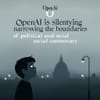OpenAI's recent policy updates have sparked controversy over the narrowing boundaries of political and social commentary on its platform, particularly with ChatGPT. The company has restricted the generation of images that critique political figures, parties, or religious institutions, even in the context of satire or parody. This move has raised concerns about censorship and the stifling of dissenting voices.
The restrictions include prohibiting depictions of living politicians, visuals criticizing political parties or government agencies, and limited imagery critiquing religious institutions or big corporations. Satire and parody are not exempt from these restrictions, which has sparked debate about the impact on free speech and public discourse.
Critics argue that these restrictions demonstrate a bias towards avoiding controversy rather than promoting open discussion. By restricting certain types of content, OpenAI may inadvertently stifle public discourse and creativity. Satire, a crucial tool for social commentary, may be particularly affected by these restrictions.
OpenAI's perspective is that it aims to present diverse perspectives without taking a stance on morally sensitive issues. The company has emphasized the importance of exploring challenging topics without arbitrary restrictions. However, the policies also aim to prevent the spread of misinformation and abuse of the platform.
The debate surrounding OpenAI's policies highlights the tension between maintaining a safe and respectful platform and preserving intellectual freedom. As AI continues to shape public discourse, finding a balance between these competing interests will be crucial. Ultimately, the impact of these restrictions on the future of online commentary and creativity remains to be seen.


